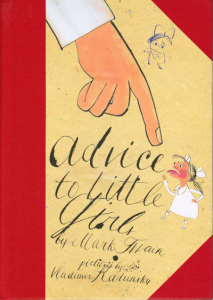Good little girls ought not to make mouths at their teachers for every trifling offense. This retaliation should only be resorted to under peculiarly aggravated circumstances. Advice to Little Girls – Mark Twain
 Mark Twain’s 1865 children’s book offers some wonderful advice to little girls.
Mark Twain’s 1865 children’s book offers some wonderful advice to little girls.
I first read about the book on Maria Popova’s blog Brain Pickings. Her post with its many images of the Victorian-scrapbook-inspired artwork by illustrator Vladimir Radunsky, meant I ordered a copy straight away.
It is such a quirky, subversive and darkly comedic text and is so perfectly illustrated that, now it has arrived, I am struggling to retain ownership – everyone who sees it wants to ‘borrow’ it.
In my experience offering advice is seldom done in such an enchanting way.
Schools are places overstuffed with advice – much like olives on an antipasto platter, schools have pimento advice bulging out of every opening and orifice.
‘Doing the right thing’ advice is found in every key competency and general capability, every classroom treaty and computer use policy, every school rule and regulation, and every ‘school way’ acronym.
So much advice is on offer that schools need a ‘Blue Book’ or its equivalent to track students who struggle to grasp (or actively eschew) the advice in various “I don’t care for pimento” actions.
“We expect children to behave well, to work hard and to respect the rights of others. If a child has difficulty in keeping to these expectations, action is taken. It involves responding immediately, consistently and keeping a clear record in the ‘Blue Book’ the number of times a child misbehaves.” Extract from New Zealand Primary School website 2013
However, as anyone who works closely with the ‘Blue Book’ will relate – they are noted for their records of recidivism – students who find it easy to repeatedly ignore the advice proffered on how to ‘live well’ and ‘learn well’ with others.
Some of the work I do with senior management and guidance counsellors (and more recently a grad student exploring master’s thesis options) uses SOLO functioning knowledge rubrics to differentiate performance outcomes for various ‘doing the right thing’ behaviours. Refer HookED Functioning Knowledge app.
Involving students in the construction of the SOLO differentiated outcomes helps students realise that ‘doing the right thing’ is not an all or nothing affair – and that making mistakes when ‘doing the right thing’ is part of learning. Students can imagine what each outcome might look like, sound like or feel like and describe this; using text, diagrams or by photographing a freeze frame of a dramatic representation or role play. For example,
- I need help to ‘do the right thing’. [Prestructural outcome]
- I can ‘do the right thing’ if I am prompted or directed. [Unistructural outcome]
- I can ‘do the right thing’ – but I make mistakes because I am not sure why or when to ‘do the right thing’. [Multistructural outcome]
- I can ‘do the right thing’. I know why and when to ‘do the right thing’. [Relational outcome]
- I can ask for feedback on how to enhance the way I ‘do the right thing’. I can help others learn how to do the right thing. I am a role model for ‘doing the right thing’. I can ‘do the right thing’ in new ways and new places. [Extended abstract outcome]
Going further and involving students in developing effective strategies for achieving these ‘doing the right thing’ outcomes means these SOLO self-assessment rubrics are resources collaboratively created by students for students. It means the process is all about working ‘with’ rather than working ‘for’ and collaborating ‘with’ rather than delivering ‘to’ students. (Charles Leadbeater ‘For, With, By and To’ ).
An example of a draft rubric I often use to start thinking about this with schools is available here. HookED Social Skills Rubric
However, I’d throw it all away in an instant to work with advice such as:
“Good little girls always show marked deference for the aged. You ought never to ‘sass’ old people unless they ‘sass’ you first.”Advice to Little Girls – Mark Twain





{ 2 comments… read them below or add one }
I love the final quote.
SOLOtaxonomy continues to guide me as a learner too with my learners.
Being on the other side of 50, I am changing the quote to read, You ought never to sass young people unless they sass you first.
Great to see you writing @arti_choke.
Thanks Sonya – has been a huge year – when I look back on where I have worked and the contract resources and projects I have written is a little hard to take in – does mean that I have had little time for writing for pleasure – so am enjoying a week out – this post almost felt like Artichoke 😉